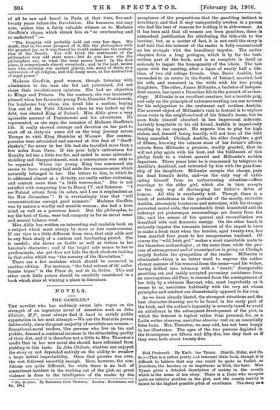NOVELS.
THE GAMBLER.*
THE novelist who has suddenly swum into vogue on the strength of an ingenious novel of sensation such as John Chilote, M.P., must always find it hard to satisfy public expectation in her next attempt.—We use the feminine person deliberately, since the great majority of novelists are women.- Sensational-novel readers, like persons who live on tea and pickles, demand a continual increase in the stimulating quality of their diet, and it is therefore not a little to Mrs. Thurston's credit that in her new novel she should have refrained from yielding to this taste. In John Chileote, whether one enjoyed the story or not depended entirely on the ability to swallow a large initial improbability. Once that process was over, the rest followed smoothly enough. Here, however, the con- ditions are quite different, for while there is no lack of sensational incident in the working out of the plot, no great violence is done to the intelligence of the reader by the
* The Gambler. By Katherine Cecil Thurston. London: Hutchinson and CO. [613.]
acceptance of the propositions that the gambling instinct is hereditary, and that it may unexpectedly awaken in a person
who had the best of reasons for holding it in abhorrence. As it has been said that all women are born gamblers, there is antecedent justification for attributing the title-role to the heroine; but, as a matter of fact, it is not until the story is half told that the interest of the reader is fully concentrated on her struggle with the hereditary impulse. The earlier chapters form a long prologue, which is by far the best- written part of the book, and is so complete in itself as seriously to impair the homogeneity of the whole. The tale opens with the meeting, after a lapse of nearly half a life- time, of two old college friends. One, Denis Asshlin, has succeeded to an estate in the South of Ireland, married, lost his wife, and remained in the wilds with his two young daughters. The other, James Milbanke, a bachelor of indepen- dent means, has spent a blameless life in the pursuit of archae- ology. Milbanke is an excellent creature, but a terrible pig, and only on the principle of extremes meeting can one account for his subjugation to the exuberant and reckless Asshlin. The avowed object of Milbanke's visit to Ireland is to explore some ruins in the neighbourhood of his friend's house, but he soon finds himself absorbed in less impersonal interests. Lavishly hospitable to his old friend, Asshlin is imperiously exacting in one respect. He expects him to play for high stakes, and, himself losing heavily, will not hear of the debt being cancelled. Clodagh Asshlin, his elder daughter, a girl of fifteen, knowing the ruinous state of her father's affairs, extorts from Milbanke a promise, readily granted, that :he will not play again with his host, and the fulfilment of this pledge leads to a violent quarrel and Milba.nke's sudden departure. Three years later he is summoned by telegram to Asshlin's deathbed, and entrusted by him with the guardian- ship of his daughters. Milbanke accepts the charge, pays his dead friend's debts, and—as the only way of extri- cating himself from an embarrassing situation—offers marriage to the elder girl, which she in turn accepts as the only way of discharging her father's debts of honour. All this is excellently told. Though there is a touch of melodrama in the portrait of the moody, excitable Asshlin, alternately boisterous and saturnine, with his strange perverted moral code, the ramshackle Irish household and Its unkempt yet picturesque surroundings are drawn from the life, and the scenes of the quarrel and reconciliation are described with real dramatic energy. On the other hand, it seriously impairs the romantic interest of the sequel to have to make a fresh start when the heroine, aged tweaty-two, has been married four years to her sexagenarian husband. Of course the "wild Irish girl" makes a most unsuitable mate to the blameless archaeologist ; at the same time, while the pro- cess of estrangement and of emancipation is going on Clodagh largely forfeits the sympathies of the reader. Milbanke is eliminated—there is no better word to express the rather clumsy manner of his removal from the scene—and his widow, having drifted into intimacy with a "smart," disreputable gambling set, and rashly accepted pecuniary assistance from an unscrupulous old Peer, is rescued from the consequences of her folly by a virtuous Baronet, who, most improbably as it seems to us, associates habitually with the very set whose principles and conduct are diametrically opposed to his own.
As we have already hinted, the strongest situations and the best character-drawing are to be found in the early part of the book, and the author's ingenuity is severely taxed to avoid an anticlimax in the subsequent development of the plot; in which the interest is topical rather than personal, for, as a. Latin writer observes, arbieitiae aleariae rest on an essentially false basis. Mrs. Thurston, we may add, has not been happy in her illustrator. The ages of the two persons depicted in the frontispiece are fifteen and fifty-five, but they look as if they were both about twenty-five.










































 Previous page
Previous page